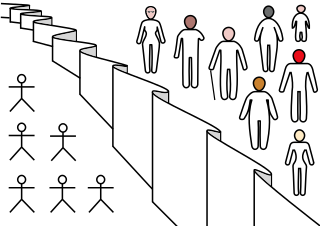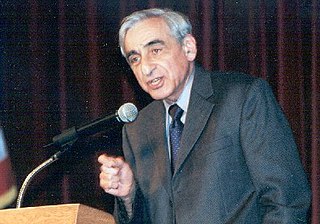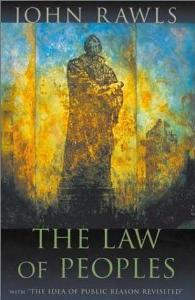Summary
Justice as Fairness is a revision of Rawls's A Theory of Justice (1971). Rawls is responding to criticism as well as adding further thought to his earlier A Theory of Justice. It was written shortly before his death in 2002. In part I, he discusses several fundamental ideas, all of which are familiar to a reader of his earlier book as well as Political Liberalism (1995): a well-ordered society; the basic structure of society; the original position; free and equal persons; public justification; reflective equilibrium; and overlapping consensus. In part II, he moves on to his principles of justice, revising them from his earlier edition, which now read (p. 42):
(a) Each person has the same indefeasible claim to a fully adequate scheme of equal basic liberties, which scheme is compatible with the same scheme of liberties for all; and
(b) Social and economic inequalities are to satisfy two conditions: first, they are to be attached to offices and positions open to all under conditions of fair equality of opportunity; and second, they are to be to the greatest benefit of the least-advantaged members of society (the difference principle).
In part III, Rawls expands on his argument for the two principles of the Original position . Here he brings in a new concept, that of Public reason , an idea that is not well discussed in Theory of Justice.
Part IV takes the reader to public institutions that will be present in a just and fair society. He lists five types of social systems:
- Laissez-faire capitalism
- Welfare-state capitalism
- State socialism with a command economy
- Property-owning democracy
- Liberal socialism
Rawls holds that the first three "[violate] the two principles of justice in at least one way" (p. 137), thus leaving only (4) property-owning democracy and (5) liberal socialism as the "ideal descriptions" that include "arrangements designed to satisfy the two principles of justice" (p. 138). In part V he explains why political liberalism is not only possible, but why it is not utopian thinking to believe that such a society is possible.
Looking primarily at the twentieth-century United States, he is certain that institutions within US society are causing injustices. The very expensive campaign system essentially rules out all but the very rich from even deciding to run for public office. The expense of healthcare restricts the best care to those who can afford it, leaving the poor to only the most basic of services.

Justice, in its broadest sense, is the concept that individuals are to be treated in a manner that is equitable and fair.

Political philosophy or political theory is the philosophical study of government, addressing questions about the nature, scope, and legitimacy of public agents and institutions and the relationships between them. Its topics include politics, justice, liberty, property, rights, law, and the enforcement of laws by authority: what they are, if they are needed, what makes a government legitimate, what rights and freedoms it should protect, what form it should take, what the law is, and what duties citizens owe to a legitimate government, if any, and when it may be legitimately overthrown, if ever.
Social justice is justice in relation to a fair balance in the distribution of wealth, opportunities, and privileges within a society where individuals' rights are recognized and protected. In Western and Asian cultures, the concept of social justice has often referred to the process of ensuring that individuals fulfill their societal roles and receive their due from society. In the current movements for social justice, the emphasis has been on the breaking of barriers for social mobility, the creation of safety nets, and economic justice. Social justice assigns rights and duties in the institutions of society, which enables people to receive the basic benefits and burdens of cooperation. The relevant institutions often include taxation, social insurance, public health, public school, public services, labor law and regulation of markets, to ensure distribution of wealth, and equal opportunity.

John Bordley Rawls was a American moral, legal and political philosopher in the modern liberal tradition. Rawls has been described as one of the most influential political philosophers of the 20th century.
Distributive justice concerns the socially just allocation of resources, goods, opportunity in a society. It is concerned with how to allocate resources fairly among members of a society, taking into account factors such as wealth, income, and social status. Often contrasted with just process and formal equal opportunity, distributive justice concentrates on outcomes. This subject has been given considerable attention in philosophy and the social sciences. Theorists have developed widely different conceptions of distributive justice. These have contributed to debates around the arrangement of social, political and economic institutions to promote the just distribution of benefits and burdens within a society. Most contemporary theories of distributive justice rest on the precondition of material scarcity. From that precondition arises the need for principles to resolve competing interest and claims concerning a just or at least morally preferable distribution of scarce resources.

The original position (OP), often referred to as the veil of ignorance, is a thought experiment used for reasoning about the principles that should structure a society based on mutual dependence. The phrases original position and veil of ignorance were coined by the American philosopher John Rawls, but the thought experiment itself was developed by William Vickrey and John Harsanyi in earlier writings.

A Theory of Justice is a 1971 work of political philosophy and ethics by the philosopher John Rawls (1921–2002) in which the author attempts to provide a moral theory alternative to utilitarianism and that addresses the problem of distributive justice . The theory uses an updated form of Kantian philosophy and a variant form of conventional social contract theory. Rawls's theory of justice is fully a political theory of justice as opposed to other forms of justice discussed in other disciplines and contexts.
"Justice as Fairness: Political not Metaphysical" is an essay by John Rawls, published in 1985. In it he describes his conception of justice. It comprises two main principles of liberty and equality; the second is subdivided into fair equality of opportunity and the difference principle.
In philosophy, economics, and political science, the common good is either what is shared and beneficial for all or most members of a given community, or alternatively, what is achieved by citizenship, collective action, and active participation in the realm of politics and public service. The concept of the common good differs significantly among philosophical doctrines. Early conceptions of the common good were set out by Ancient Greek philosophers, including Aristotle and Plato. One understanding of the common good rooted in Aristotle's philosophy remains in common usage today, referring to what one contemporary scholar calls the "good proper to, and attainable only by, the community, yet individually shared by its members."

Michael Laban Walzer is an American political theorist and public intellectual. A professor emeritus at the Institute for Advanced Study (IAS) in Princeton, New Jersey, he is editor emeritus of Dissent, an intellectual magazine that he has been affiliated with since his years as an undergraduate at Brandeis University. He has written books and essays on a wide range of topics—many in political ethics—including just and unjust wars, nationalism, ethnicity, Zionism, economic justice, social criticism, radicalism, tolerance, and political obligation. He is also a contributing editor to The New Republic. To date, he has written 27 books and published over 300 articles, essays, and book reviews in Dissent, The New Republic, The New York Review of Books, The New Yorker, The New York Times, Harpers, and many philosophical and political science journals.

Political Liberalism is a 1993 book by the American philosopher John Rawls, an update to his earlier A Theory of Justice (1971). In it, he attempts to show that his theory of justice is not a "comprehensive conception of the good" but is instead compatible with a liberal conception of the role of justice, namely, that government should be neutral between competing conceptions of the good. Rawls tries to show that his two principles of justice, properly understood, form a "theory of the right" which would be supported by all reasonable individuals, even under conditions of reasonable pluralism. The mechanism by which he demonstrates this is called "overlapping consensus". Here he also develops his idea of public reason.

The Law of Peoples is American philosopher John Rawls' work on international relations. First published in 1993 as a short article, in 1999 it was expanded and joined with another essay, "The Idea of Public Reason Revisited" to form a full-length book. Rawls's basic distinction in international politics is that his preferred emphasis on a society of peoples is separate from the more conventional discussion of international politics as based upon relationships between states. It is an attempt to show "how the content of a Law of Peoples might be developed out of a liberal idea of justice similar to, but more general than, the idea I call justice as fairness".
Overlapping consensus is a term coined by John Rawls in A Theory of Justice and developed in Political Liberalism. The term overlapping consensus refers to how supporters of different comprehensive normative doctrines—that entail apparently inconsistent conceptions of justice—can agree on particular principles of justice that underwrite a political community's basic social institutions. Comprehensive doctrines can include systems of religion, political ideology, or morality.
Articles in social and political philosophy include:
Justice and the market is an ethical perspective based upon the allocation of scarce resources within a society. The allocation of resources depends upon governmental policies and the societal attitudes of the individuals who exist within the society. Personal perspectives are based upon ones circle of moral concern or those who the individual deems worthy of moral consideration.

Liberalism and the Limits of Justice is a book about liberalism by the philosopher Michael Sandel. The work helped start the liberalism-communitarianism debate that dominated Anglo-American political philosophy in the 1980s.
Liberal socialism is a political philosophy that incorporates liberal principles to socialism. This synthesis sees liberalism as the political theory that takes the inner freedom of the human spirit as a given and adopts liberty as the goal, means and rule of shared human life. Socialism is seen as the method to realize this recognition of liberty through political and economic autonomy and emancipation from the grip of pressing material necessity. Liberal socialism opposes abolishing certain components of capitalism and supports something approximating a mixed economy that includes both social ownership and private property in capital goods.

Free Market Fairness is a 2012 book of political philosophy written by John Tomasi, president of the Heterodox Academy and former Professor of Political Philosophy at Brown University. Tomasi presents the concept of "free market fairness" or "market democracy," a middle ground between Friedrich Hayek and John Rawls's ideas. The book was widely reviewed.
A property-owning democracy is a social system whereby state institutions enable a fair distribution of productive property across the populace generally, rather than allowing monopolies to form and dominate. This intends to ensure that all individuals have a fair and equal opportunity to participate in the market. It is thought that this system is necessary to break the constraints of welfare-state capitalism and manifest a cooperation of citizens, who each hold equal political power and potential for economic advancement. This form of societal organisation was popularised by John Rawls, as the most effective structure amongst four other competing systems: laissez-faire capitalism, welfare-state capitalism, state socialism with a command economy and liberal socialism. The idea of a property-owning democracy is somewhat foreign in Western political philosophy, despite issues of political disenfranchisement emerging concurrent to the accelerating inequality of wealth and capital ownership over the past four decades.










